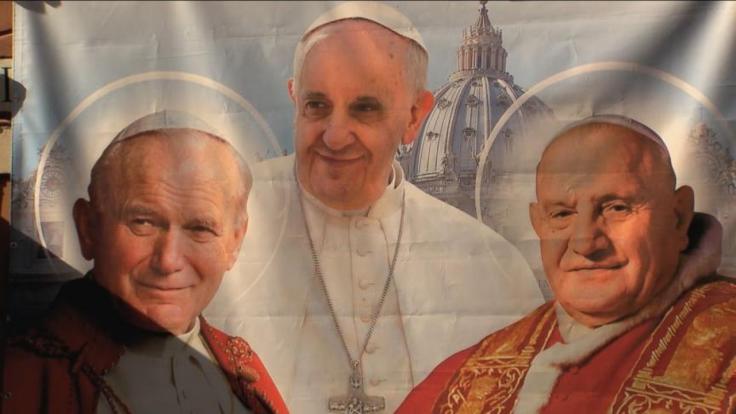John XXIII And John Paul II Become Saints

Pope Francis made
history on Sunday, elevating to sainthood John XXIII and John Paul II, two of
his most famous papal predecessors, in a ceremony bearing themes of hope and
reconciliation for the world’s one billion Roman Catholics.
With crowds filling St. Peter’s Square and spilling out
across Rome, Francis presided over an elaborate Mass beneath drizzly skies,
canonizing the two towering figures of 20th-century Catholicism, men who also
hold very different legacies in the church.
Francis, who made the decision to hold the joint
canonization, portrayed the two former popes as “men of courage” who shared a
place in history.
“They were priests, bishops and popes of the 20th century,”
he said in his homily. “They lived through the tragic events of that century,
but they were not overwhelmed by them. For them, God was more powerful; faith
was more powerful.”
National Pride Swells the Crowds for a Polish SaintAPRIL 27,
2014
The Roman Catholic church is canonizing John Paul II, left
in a portrait in Vatican City on Saturday, and John XXIII.Sainthood for 2
Predecessors Allows Pope to Straddle DivideAPRIL 26, 2014
Never before had two popes been canonized at the same time,
and the pairing attracted large, joyous crowds tramping through Rome, with many
people waving flags or banners. Francis declared the two men saints shortly
after the Mass began, a pronouncement greeted with rising applause from the
square and followed by the presentation of relics linked to the two new saints.
St. Peter’s Square was packed with tourists and pilgrims on
Friday ahead of the canonizations of John XXIII and John Paul II on Sunday.
Credit Stefano Rellandini/Reuters
Notable among the cardinals and political leaders seated
near the outdoor altar was Benedict XVI, the former pope who has remained
largely out of the public eye since his historic resignation last year. His
decision to step down led to the papal election of Francis.
Many people also came from John Paul’s native Poland, where
he is a hero for his fight against Communism.
“It’s a very special day for every Pole, in particular for
young people for whom John Paul II meant a new history, for our country and for
Europe, as well,” said Lucasz Novak, 38, who came from northeastern Poland on a
seven-day tour of holy sites in Italy.
“For Poland, it’s a holy moment,” he said from St. Peter’s
Square, as he used his smartphone to listen to a live broadcast of the
celebration on Vatican Radio’s Polish channel. “For Catholics all over the
world, it’s a holy moment. We could not not be here.”
For Francis, who has emerged as a major global figure after
only a year as pope, the canonization ceremony offered a stage to underscore
his broad agenda of trying to bring together different Catholic factions as he prepares
for two major meetings in which prelates are expected to address some of the
most contentious social issues facing the church.
In the days before the ceremony, however, Vatican officials
had sought to dispel the political subtext of the event — that the two former
popes are icons to different constituencies within the church, and that by
canonizing them together, Francis was making a political statement as well as a
religious one.
John XXIII is a hero to many liberal Catholics for his
Second Vatican Council of the early 1960s, which sought to open the church to
the modern era. John Paul II is a hero to many conservative Catholics — not
only for his anti-Communist heroism and personal charisma, but also because of
his resistance to liberalizing elements of the church.
No comments:
Post a Comment